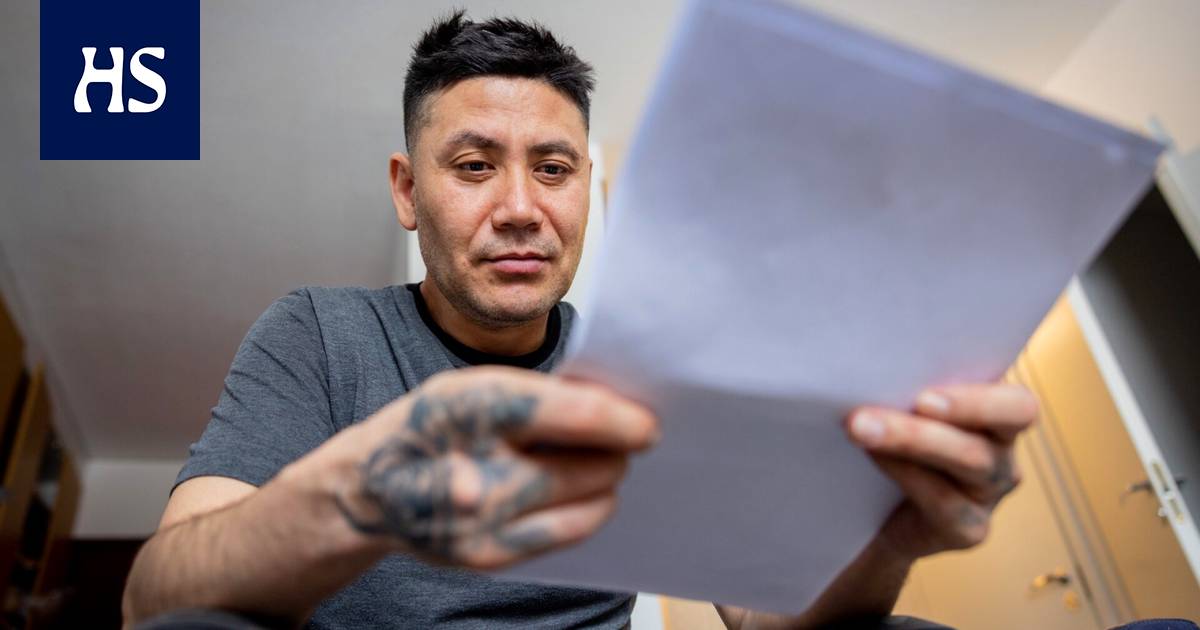Javid Zamani, who received Finnish citizenship, works at a car factory, but in his spare time he stays within four walls. He is seriously depressed because his wife has not made it to Finland.
Javid Zamani, 30, opens the door of his home to the newcomer and apologizes for the smell.
“An old building,” he explains.
The day before the interview, Zamani has cleaned his small studio carefully. He has placed Pågen ear trees on the serving plate and bought apples in the basket.
This is the apartment where Zaman spends all his free time. A man who works at the Uusikaupunki car factory does not meet anyone after his working days, does not go anywhere and does not talk to anyone.
“I have no life. I try to stay away from all people because I can’t trust anyone anymore. I’m really depressed.”
Afghan background Zamani arrived in Finland about 16 years ago as a 14-year-old lone asylum seeker.
With a residence permit, he studied a basic degree in logistics in Oulu and applied for work life. He was later granted Finnish citizenship.
In 2019, Zamani moved to Uusikaupunki and got to work at the Valmet Automotive factory.
Javid Zamani says his only friends are his wife, with whom he is in daily contact, and the television, which Zamani likes to keep on in the background when he is at home.
My time is one of those people with a foreign background, on whom both the Uudenkaupunki car factory and many other companies operating in Finland largely run.
According to the Finnish Business Research Institute (Etla), in 2020 the share of employees with a foreign background was 7.5 percent of all employed people in Finland. The number has almost doubled in the last ten years.
And more is needed, according to Etla’s calculations. Finland’s population is aging, and fewer and fewer children are being born.
Etla has calculated that Finland needs a net immigration of up to 44,000 people each year to stop the decrease in the labor force. Net immigration means the difference between immigration and emigration.
The amount clearly exceeds the assumptions about the net change in the coming years.
Read more: Etla: Immigration should triple in order to stabilize the number of working-age people
Job- and the Ministry of Economic Affairs finances guidance and counseling services aimed at immigrants in several Finnish municipalities.
Services are also offered in Uusikaupunki and the rest of Vakka-Finland, where a company called Ukipolis is responsible for them. Its project coordinator Granger Simmons says that there is a crying need for services and advice.
The Ukipolis office alone has advised and helped more than 430 immigrants since September.
According to Simmons, it is not enough to just invite people to work in Finland from abroad. He says that Finland must also take better care of integration, meaningfulness of life and well-being after arrival.
For example, getting the family to come to Finland is important if employees want to stay here for a long time. Otherwise, according to Simmons, a person can experience serious feelings of exclusion.
“In this job, I have met quite a few people who have not brought their families to Finland. They feel that they are just robots with nothing in life but work. They don’t have a normal life outside of work.”
Zaman’s important document is the marriage certificate. However, it has not brought a wife to Finland.
Also The reason for Javid Zaman’s loneliness is his wife who lives in another country, which Zamani has not been able to get from Afghanistan to Finland despite all his efforts.
Zamani got to know his wife, who is four years younger than him, in the corona spring of 2020 on Facebook. Getting to know each other led to falling in love, Whatsapp calls and daily contact. Four months later, due to the pandemic, the couple got married remotely and by proxy.
The Finnish Marriage Act considers a marriage concluded by proxy to be valid in Finland, if it is valid in the country where the proxy marriage was concluded. Proxy marriage is legal in Afghanistan.
However, the Immigration Office did not consider Zamani’s fear of traveling to Afghanistan as a sufficiently valid reason for concluding a proxy marriage. According to the agency, the couple could have married there or in a third country.
Zamani feels the decision as bullying.
“I couldn’t go to Afghanistan because I’m in danger of my life there. In addition, in 2020, traveling to, for example, Iran was particularly difficult due to the corona pandemic.”
Zamani lives in an old townhouse unit, from where he goes to work and back. Apart from occasional shopping trips, he hardly leaves his house in his spare time.
At the end of 2021, the couple finally got to meet each other when Zamani traveled to Iran. He describes it as the happiest time of his life.
HS has seen related papers, including the marriage certificate confirmed at the Finnish Embassy in Kabul and the subsequent negative decision of the Immigration Office on Zaman’s wife’s residence permit application based on marriage.
Ukipolis Granger Simmons says that there are sometimes problems with family reunification, especially if the marriage took place according to the culture of the country of origin.
Even at the moment, he has as a client a man of African descent who has obtained Finnish citizenship, whose wife has not been able to get to Finland.
“Marriages are sometimes arranged, as has been customary in the cultures of the countries of origin. It could have caused problems in Finland. Even in the case of this man of African descent, the Finnish Immigration Service issued a negative decision because it did not believe that the spouses were really together.”
However, Simmons hopes for more understanding of how much family size affects a person’s mental and physical well-being in both countries.
“The situations are really heavy and difficult. In many countries, the truth is that a wife is not safe alone without a husband. Wives are trying to manage alone, possibly with a child, and the father of the family can’t say anything other than ‘I hope you can come’.”
The most important thing according to Simmons, is what happens after a person with a foreign background moves to Finland.
He considers one of his clients with a foreign background as a good example, who just moved to Sweden for work. In the job interview, the man was asked, among other things, what kind of things he likes in his free time.
“He went to Sweden to do a job similar to what he did in Uusikaupunki, but now he felt important from the start. The employer had already thought of everything, including places for hobbies, and even added tickets to basketball matches to the welcome package for a man who likes basketball.”
The Swedish employer also sent a moving company to Uuteenkaupunki to pick up the man’s belongings. When the man had arrived at his new home in the morning, everything was ready to start a new life.
“He said that he feels that he is important as a person and welcome in a new country. We don’t know this in Finland.”
Simmons says he gets annoyed when he hears the kind of promises and enticements that international recruitment companies make.
“We show the sun and beautiful landscapes, we welcome you to work and live in the happiest country in the world, where the happiest people live. And then people’s experiences can be completely opposites.”
Javid Zamani says that when he’s depressed, even food doesn’t taste good and he doesn’t mind making good food for himself alone.
Javid Zamani says that now his wife is also depressed in Afghanistan. The wife has trained as a midwife but has no longer been allowed to do work corresponding to her training due to the country’s instability.
“I feel like I can only manage myself now because of my family. There is no other reason and we don’t know what to do. My wife does not dare to go out, does not dare to eat. He feels sad and bad all the time.”
Zamani says that he avoids all kinds of conversations with other people.
“Everyone else has their own life. They are fine, they are happy, they have a family here. I feel bad around them, that’s why I stay away. I feel like I’m the only one suffering.”
In his dreams, Zamani lives a calmer and better life together with his wife.
“We would live a normal life, like other people. We would work and buy our own apartment. We would be happy right here in our normal everyday life.”
Zamani wishes for a normal, peaceful and happy life for himself and his wife.
How does this relate to the election? Immigration, especially work-related immigration, is one of the topics that sparked debate in the elections.
Do you want more reading from the Turku region? Subscribe to the HS Turku newsletter from here.
#Turku #Javid #Zamani #works #car #factory #doesnt #normal #life









